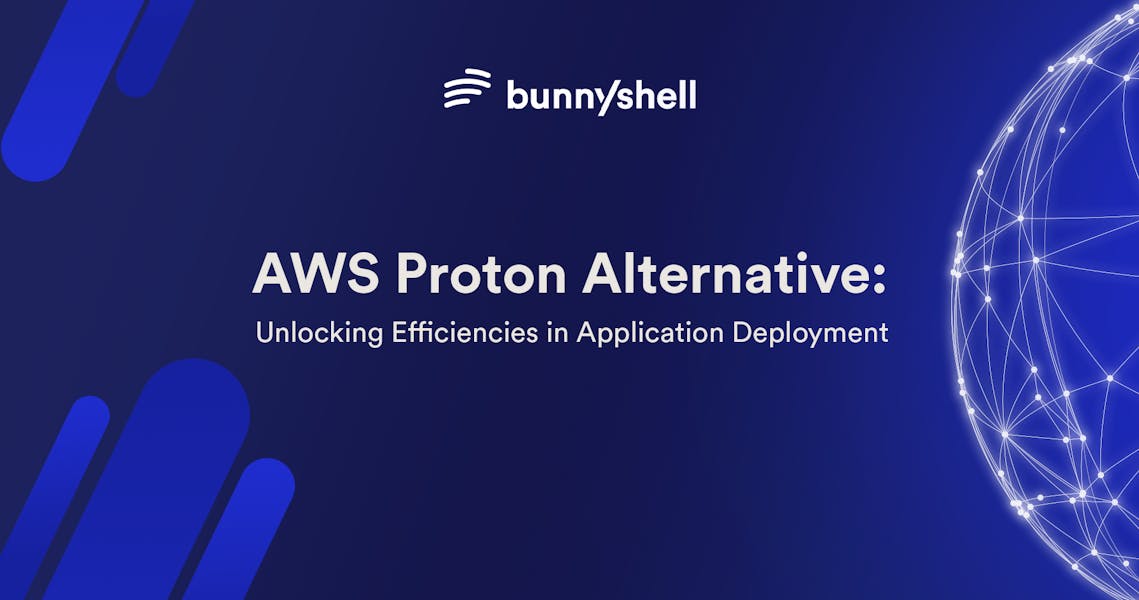In the dynamic landscape of application deployment, efficiency, and effectiveness stand as pillars of modern success. The emergence of state-of-the-art solutions like Bunnyshell and AWS Proton promises to redefine the deployment paradigm, offering streamlined management and scalability.
This article undertakes a comprehensive comparative exploration, delving into the features, advantages, integrations, and unique offerings of Bunnyshell and AWS Proton. This detailed analysis aims to present Bunnyshell as an AWS Proton alternative for teams who use multiple cloud providers.
About Bunnyshell
Bunnyshell is a comprehensive Environments-as-a-Service platform designed to simplify application deployment, management, and scaling across multiple cloud providers. It offers a versatile range of automation tools and features to streamline the development lifecycle, supporting customization and integration with various tools. Ideal for organizations seeking a unified solution for DevOps processes across different cloud environments.
About AWS Proton
AWS Proton is an Amazon Web Services (AWS) service focused on simplifying the deployment and management of container and serverless applications within the AWS ecosystem. It provides standardized templates, deployment models, and best practices to create consistent, scalable, and secure applications, specifically within the AWS environment. The platform is most suitable for AWS-centric teams aiming to adhere to AWS standards and achieve streamlined deployment.
Bunnyshell vs AWS Proton Comparison
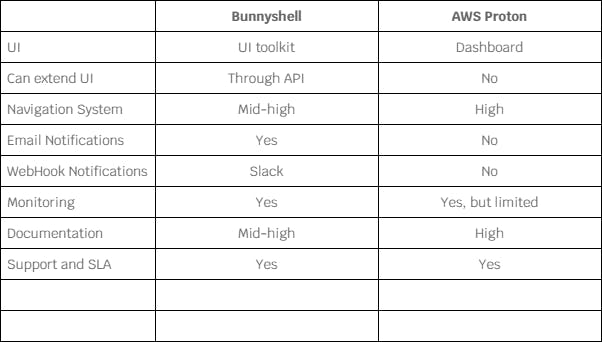
BunnyShell vs AWS Proton
Developer Experience
AWS Proton offers developers a simplified and efficient experience for managing application deployments within the Amazon Web Services (AWS) ecosystem by providing predefined templates and deployment models that adhere to AWS best practices, freeing developers to focus on coding rather than infrastructure management. With standardized environments, developers can ensure consistency and reliability across different stages of the development lifecycle.
Release pipelines can be created to automate deployment stages, ensuring proper testing and validation before applications reach production. AWS Proton also integrates seamlessly with popular CI/CD tools, allowing developers to harmonize existing workflows and pipelines.
The platform’s integration with AWS Service Catalog enables effective versioning and governance, promoting compliance with organizational standards. Moreover, resource management becomes more accessible, enabling developers to configure and manage resources required for their applications.
AWS Proton’s cohesive developer experience extends to integrating with various AWS services, including IAM, CloudFormation, and CodePipeline. This integration ensures a unified and efficient approach to application deployment and management within the AWS environment.
Bunnyshell enhances the developer experience by providing a user-friendly platform for streamlined application deployment and management. The focus is on simplifying the deployment process through intuitive interfaces, automation, and predefined templates. Developers benefit from seamless integration with their existing CI/CD workflows, allowing for efficient code deployment.
Monitoring capabilities offer insights into application performance, while the promotion of Infrastructure as Code (IaC) principles empower developers to manage infrastructure using code, enhancing consistency and collaboration. Bunnyshell’s support for multiple cloud providers caters to diverse project needs.
Collaboration is facilitated through version control and teamwork features, enabling multiple developers to work harmoniously. Security and compliance are upheld with encryption, access controls, and adherence to industry standards.
Customization is a key aspect, allowing developers to tailor deployment processes to fit their specific requirements and choose the best infrastructure setup. Overall, Bunnyshell’s developer experience revolves around simplification, automation, flexibility, and collaboration in managing applications efficiently.
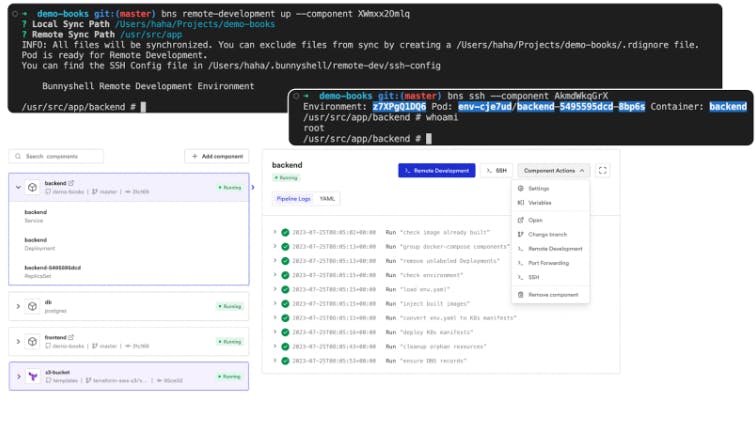
Security
AWS Proton prioritizes security within the Amazon Web Services (AWS) ecosystem to ensure the protection of applications and data. By leveraging AWS infrastructure, Proton employs encryption for data both in transit and at rest, establishing a secure foundation. Identity and Access Management (IAM) integration enables precise control over user permissions, limiting access to authorized personnel and actions.
Proton maintains isolation between application environments to prevent unauthorized access or interference across deployments. The platform encourages secure resource configurations, adhering to best practices such as least privilege access and regular updates. Audit trails and logs enhance transparency by tracking activities and changes, aiding compliance and incident response.
Bunnyshell prioritizes security within its platform, aiming to ensure the protection of applications and data. Data is safeguarded through encryption during transit and while at rest, maintaining the integrity of sensitive information. Access control mechanisms enable effective management of user permissions, restricting unauthorized access to specific platform resources and functionalities.
Authentication and authorization processes validate user identities and ensure that access is granted based on roles and responsibilities. The platform’s underlying infrastructure is regularly updated and patched to enhance security and prevent vulnerabilities.
Monitoring features and audit logs contribute to transparency by tracking user activities and changes, which can aid in compliance efforts and incident response. Collaboration security is also upheld to enable teams to work together securely. Integration with third-party services might involve adhering to their security protocols as well, ensuring comprehensive protection.
Integrations
AWS Proton seamlessly integrates with a variety of AWS services, enhancing the application deployment process. These integrations include:
- identity and access management
- standardized service creation
- infrastructure provisioning
- CI/CD pipeline incorporation
- event-triggered automation
- encryption
- monitoring
- version control
- collaboration tools
- custom interactions.
These integrations collectively offer a comprehensive and efficient environment for deploying and managing applications within the AWS ecosystem.
Bunnyshell integrates seamlessly with various tools and services to enhance application deployment and management. This includes connecting with version control systems like Git, collaborating through platforms like Slack, and integrating with CI/CD pipelines for streamlined workflows.
Monitoring services offer insights, while database integrations simplify resource management. Multi-cloud compatibility extends deployment options, and integrations with webhooks and APIs enhance automation and communication. Security measures are bolstered through authentication providers. Bunnyshell’s integrations collectively enhance collaboration, efficiency, and customization, offering users a versatile solution for their deployment needs.
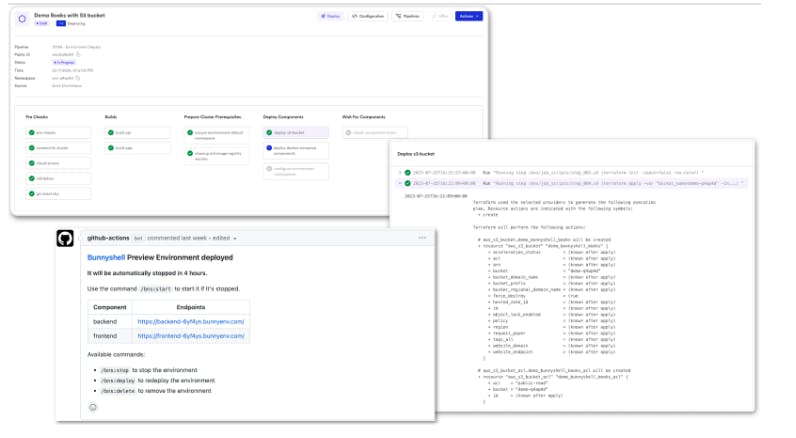
Engineering Metrics Dashboard
AWS Proton does not inherently include a dedicated dashboard as part of its core features; instead, services like AWS CloudWatch can be used for monitoring, logging, and analytics capabilities.
Bunnyshell’s engineering metrics dashboard is designed to offer users insights into various aspects of their application deployments and infrastructure performance. It features:
- performance metrics: CPU usage, memory utilization, disk space, network activity, and response times
- resource utilization / resource allocation
- application health: error rates, uptime percentages, and the status of different components
- alerts and notifications based on predefined thresholds
Bunnyshell’s dashboard can also be customized with metrics and insights that are most relevant to your application and business needs.
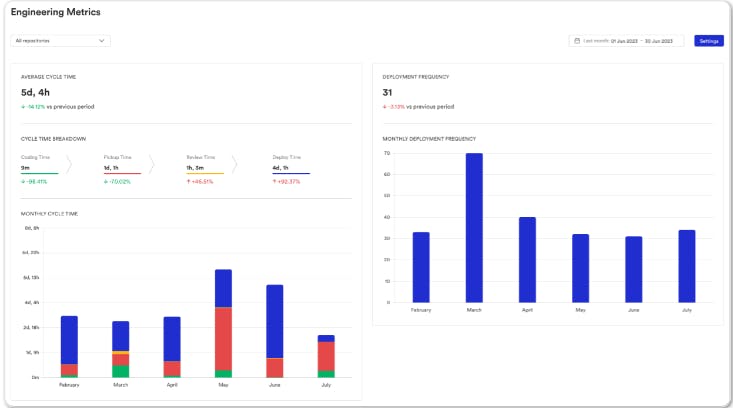
Bunnyshell vs AWS Proton Pricing
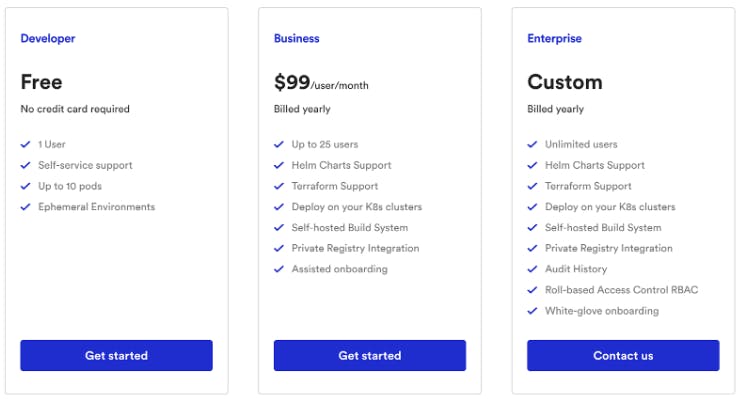
Bunnyshell Price Table
AWS Proton pricing: ask for a quote
Summing Up: 7 Reasons to Choose Bunnyshell
#1 Simplicity and Ease of Use: Bunnyshell is known for its user-friendly interface and streamlined deployment process.
#2 Wide Integration Support: Bunnyshell offers integrations with various version control, collaboration, and monitoring tools.
#3 Multi-Cloud Compatibility: Bunnyshell supports deployments across multiple cloud providers, offering flexibility.
#4 Customization and Control: Bunnyshell allows greater customization of deployment processes and configurations.
#5 Existing Tool Integration: If you’re already using specific tools, Bunnyshell’s integrations might align with your current workflows.
#6 Comprehensive Metrics Dashboard: Bunnyshell provides a metrics dashboard for monitoring performance and resource utilization.
#7 Strong Focus on Security: Bunnyshell emphasizes security measures to protect applications and data.
